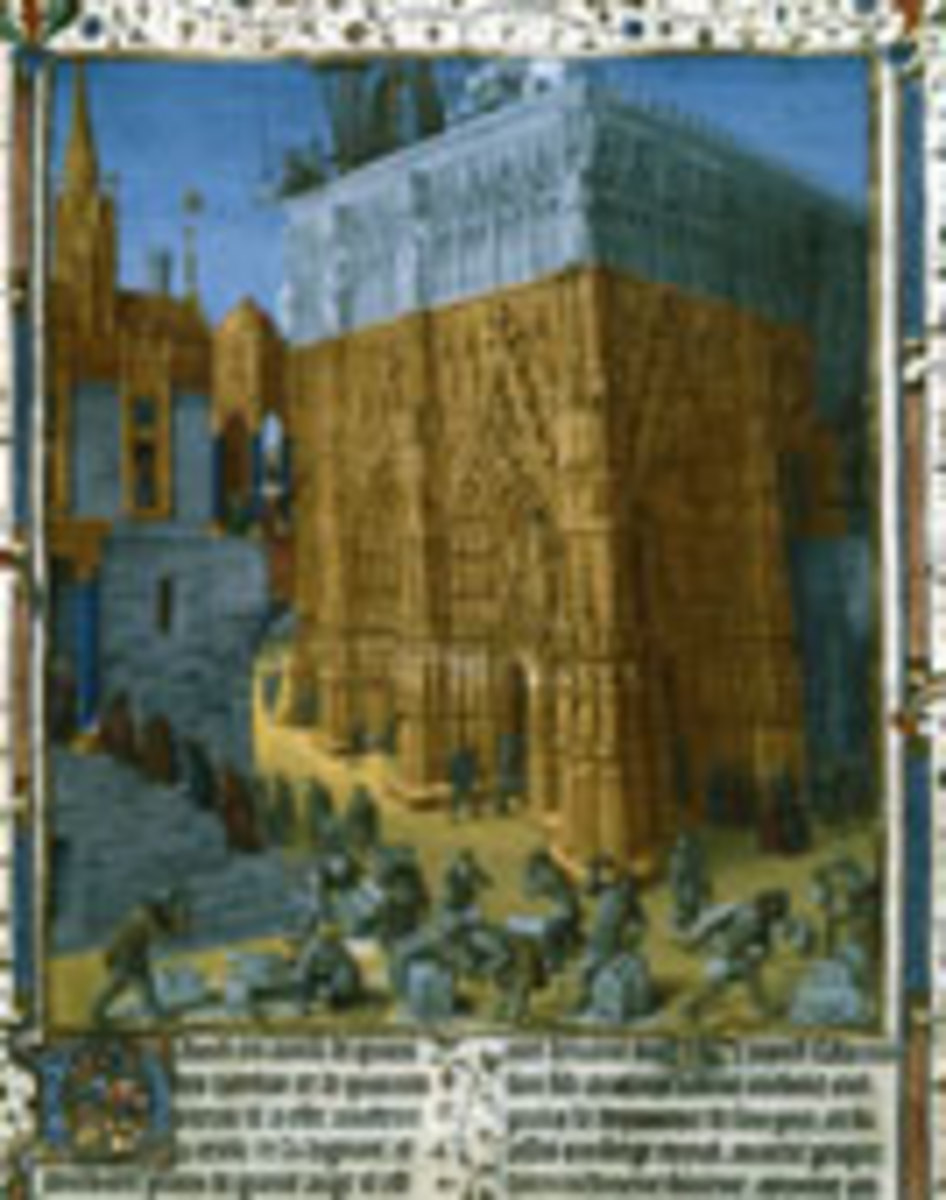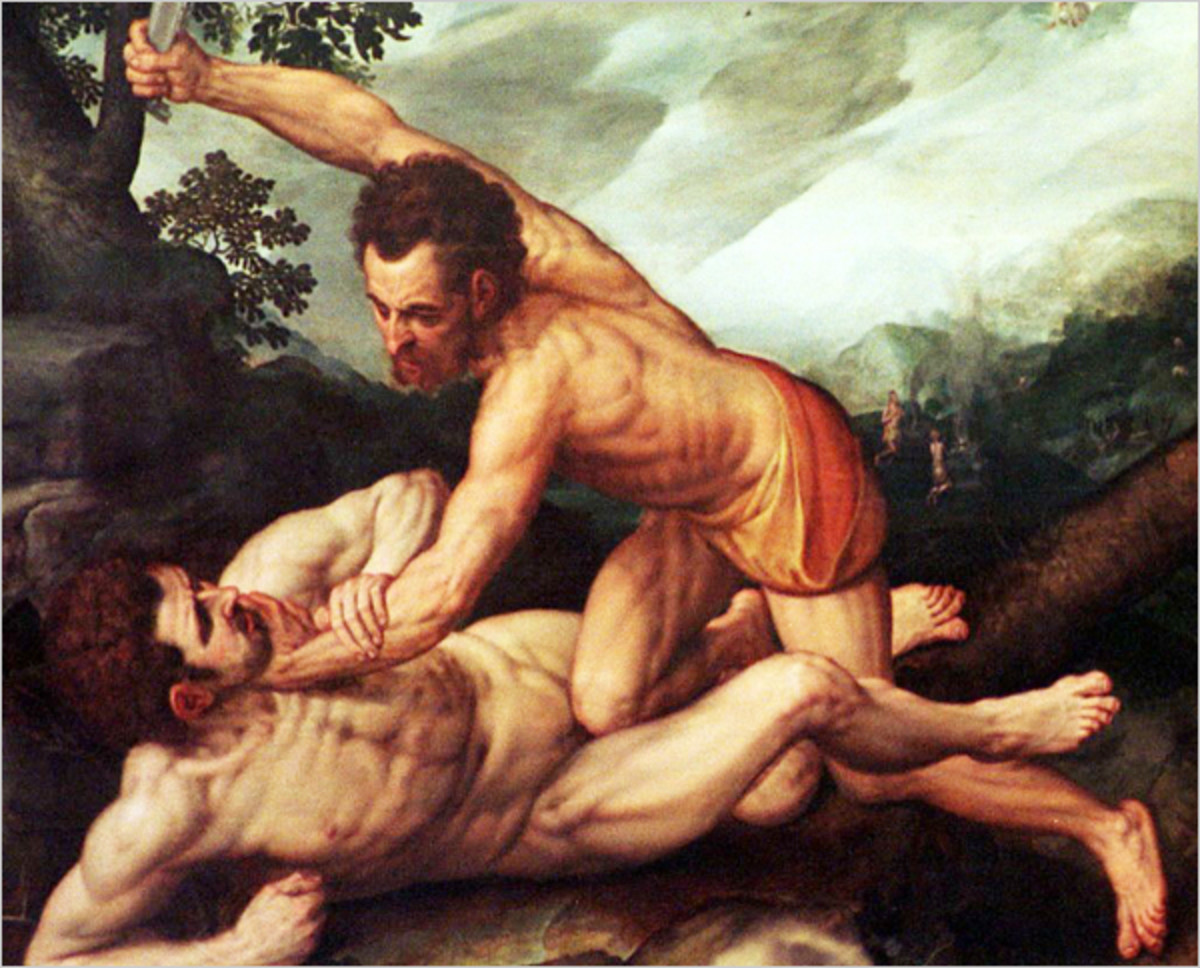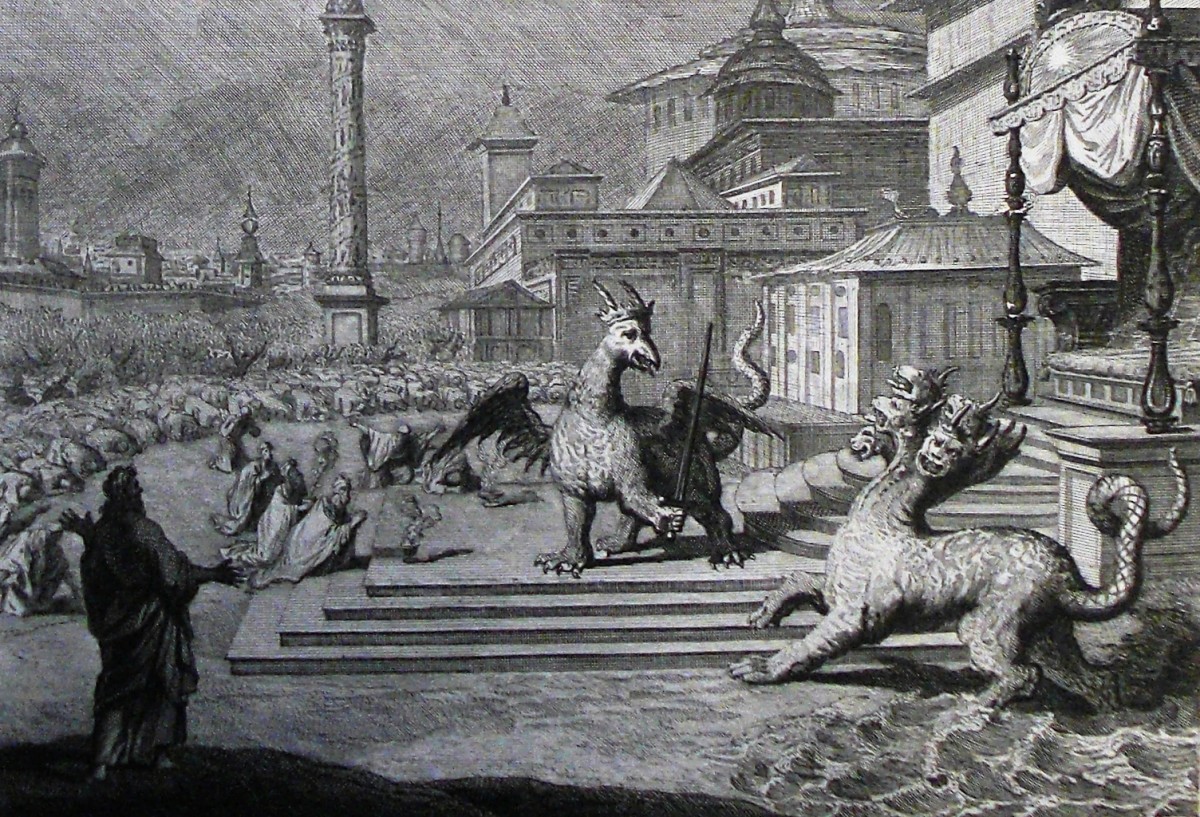Bible: What Does 1 Kings 8-10 Teach Us About Solomon's Wisdom and the Dedication of the Temple?
The Ark of the Covenant
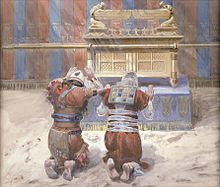
The First Temple
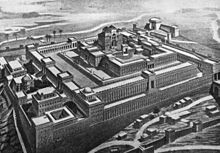
1 Kings 8
Knowing that the temple is ready to receive the Ark of the Covenant, Solomon summons all of Israel's leaders to Jerusalem in the seventh month, and commands the priests and Levites to bring the holy furniture with them from Zion (vv. 1-4).
After the king and all Israel sacrifice innumerable offerings before the ark, the priests carry it into the Most Holy Place and place it under the wings of the cherubim (vv. 5-6).
Worshipers could see the ark's poles from the holy place, but not from outside (vv. 7-8).
Of its original contents, only copies of Moses' two stone tablets remain from the days of old (v. 9).
Once the priests leave the holy place, God's glorious cloud, blinding in its brilliance, fills the temple as it did the tabernacle in Moses' day (vv. 10-11; cf. Ex. 40:34-35).
Recalling that this cloud was the dwelling of the LORD, the king proclaims that the temple will now be His eternal abode (vv. 12-13).
Addressing the great congregation, Solomon reveals that through him God has now fulfilled His promise to David, who desired to build a house for the "name" of the LORD but was not permitted to do so (vv. 14-21; 2 Sam. 7:13).
[1 Chronicles 22:8 says that God refused David this privilege, because he was a man of much bloodshed; earlier, the writer indicated that David could not build it because he was constantly at war.
Does this judgment mean that he simply did not have time to devote to building projects, or that he had taken too many lives to earn the privilege? (cf. 1 Kings 5:3].
The Temple Dedication
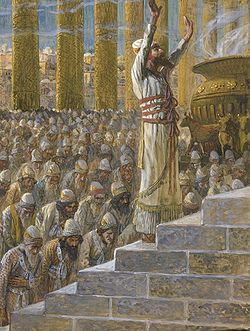
The king then utters a magnificent prayer of dedication (vv. 22-53).
With sincere expressiveness, he acknowledges Yahweh's uniqueness as the One who keeps His covenant with those whose heart is right toward Him (vv. 22-24).
As he considers this divine characteristic, Solomon boldly requests that God sustain David's dynasty (vv. 25-26).
Suddenly, after sober reflection, he seems to acquire a more humble perspective concerning his temple; Solomon understands that this Infinite One will deign to dwell on earth and listen to his prayer and to that of his people solely based on grace (vv. 27-30).
His prayer now presents a series of situations in community/individual life in which a desperate Israel might call upon the LORD for assistance (vv. 31-53).
As he petitions Yahweh, Solomon follows a certain formula.
Starting with "When"—indicating the certainty that such events will occur—he then names the particular plight that Israel might face, oftentimes because of its sin.
The king concludes with the petition: "then hear in heaven," indicating his trust that God would respond.
Prayer and Worship

Solomon wants to be as specific as he can, so he covers as many bases as possible in his intercession.
These concerns involve asking God
(1) to ensure that justice prevails in oath-taking (vv. 31-32);
(2) to restore the people to the land after a military defeat (vv. 33-34);
(3) to save them physically from the effects of drought or any other natural disaster (vv. 35-40);
(4) to reveal Himself spiritually to foreigners (vv. 41-43);
(5) to give success in battle (vv. 44-45); and
(6) to deliver them from bondage to their enemy (vv. 46-53).
Some of the themes emphasized in this prayer include:
(1) confession and repentance (vv. 33, 35, 47);
(2) forgiveness (vv. 34, 36, 39, 50);
(3) man's sinfulness (vv. 33, 35, 38, 46, 50);
(4) "evangelism" (v. 43); and
(5) the maintenance of causes (vv. 45, 49).
Rising from his knees, Solomon now blesses the congregation again (vv. 54-55).
He reminds Israel of Yahweh's faithfulness to His promise to give them rest (v. 56), and prays His continued presence with them in the way of obedience (vv. 57-58).
The king desires God's daily watchful care over him and His people, so that His word may spread to all mankind (vv. 59-60).
Finally, Solomon admonishes them to maintain loyalty to the LORD (v. 61).
The smoke from thousands upon thousands of sacrificial peace offerings soon ascends from the altar, as Israel dedicates the temple (vv. 62-63).
Solomon uses not only the altar, but also the middle of the court to complete the ceremonies (v. 64).
Then a royal feast ensues for fourteen days; on the fifteen day, everyone returns home, rejoicing over the LORD's goodness to Israel (vv. 65-66).
Requirement for Blessing
view quiz statisticsJohn MacArthur
1 Kings 9
In the kingdom's post-construction period, Yahweh visits Solomon once again (vv. 1-2; cf. 1 Kings 3:5), and informs him that He has chosen to keep His "eyes" and His "heart" on the temple continually (v. 3).
For the LORD to establish his throne, however, depends altogether upon the king's obedience (vv. 4-5).
Any apostasy, whether Solomon's or his sons', will cause three terrible events:
(1) Israel will forfeit possession of the land,
(2) God will reject the temple as His habitation, and
(3) the LORD will humiliate the people among the Gentiles (vv. 6-7). Passersby will realize that Israel's disloyalty precipitated the calamity (vv. 8-9).
At about this time Solomon also "rewards" Hiram's twenty-year commitment by giving him twenty Galilean cities (vv. 10-11).
In exchange for this gift (which Hiram termed "good for nothing"), the Tyrian king sends his "brother" one hundred twenty talents of gold (vv. 12-14).
[These cities, then, are not a gift, but payment].
Solomon's extensive building (and rebuilding) projects—houses, walls, a bastion, storage cities—require a substantial labor force (vv. 15-19).
Therefore, he drives into slavery the descendants of unconquered Canaanites; Israelites, however, the king employs as officers and overseers (vv. 20-23).
To protect his "wife," Pharaoh's daughter, Solomon builds the Millo (v. 24). In addition, three times each year he sacrifices burnt and peace offerings (v. 25).
Solomon also cooperates with Hiram once more in a shipping venture, acquiring a vast treasure of gold from Ophir (vv. 26-28).
Solomon
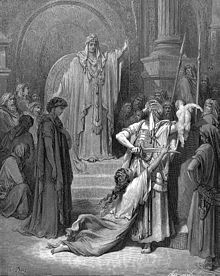
A Valuable Trading Partner
view quiz statistics1 Kings 10
Another trading partner, the Queen of Sheba, travels to Israel not only with an impressive array of commodities, but also with the searching questions of a skeptic (vv. 1-2).
After spending sufficient time in King Solomon's "classroom" and in his court, she realizes that the rumors she had heard about his great wisdom were true; in fact, the queen confesses how under-informed she had been about him (vv. 3-7).
With a better understanding, her Majesty now praises the LORD for giving Israel such a king, admitting that all his servants and people can benefit from his judgments (vv. 8-9).
She leaves Solomon's kingdom without her gold and spices, but returns home with other gifts and with a greater appreciation of Yahweh's love for Israel (vv. 10, 13).
The king's pal from Tyre, Hiram, arrives from Ophir with a fresh shipment of almug wood, which Solomon uses to make steps for the temple and his house as well as for musical instruments (vv. 11-12).
Ever greater wealth and prosperity accrue to Israel throughout Solomon's reign (v. 23).
Having gold in abundance, the king molds much of it into hundreds of shields and places them in his Lebanese House of the Forest (vv. 14-17).
He makes an ivory throne, overlays it with gold, and sets lions beside its armrests and on the steps leading up to it (vv. 18-20).
Even the drinking vessels are made of gold, not commonplace silver (v. 21; cf. v. 27a).
Every three years Hiram supplies the kingdom with exotic animals as well as more precious metals and ivory (v. 22).
Solomon wins worldwide acclaim (v. 24), and peoples continually bring more goods into Israel (v. 25).
He assembles a mighty army of chariots and horseman, imports horses, and then begins to export chariots and horses to neighboring lands (vv. 26-29).
[Solomon accomplishes many wonderful projects, but also fulfills exactly what God warned against in His law and what He told Samuel would happen when Israel received "a king like the other nations" (see Deut. 17:16,17; 1 Sam. 8:10-18)].
© 2013 glynch1


